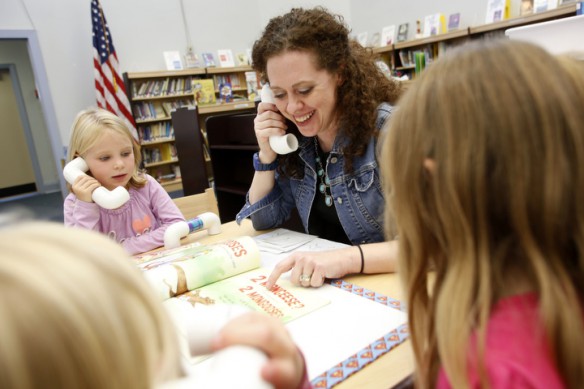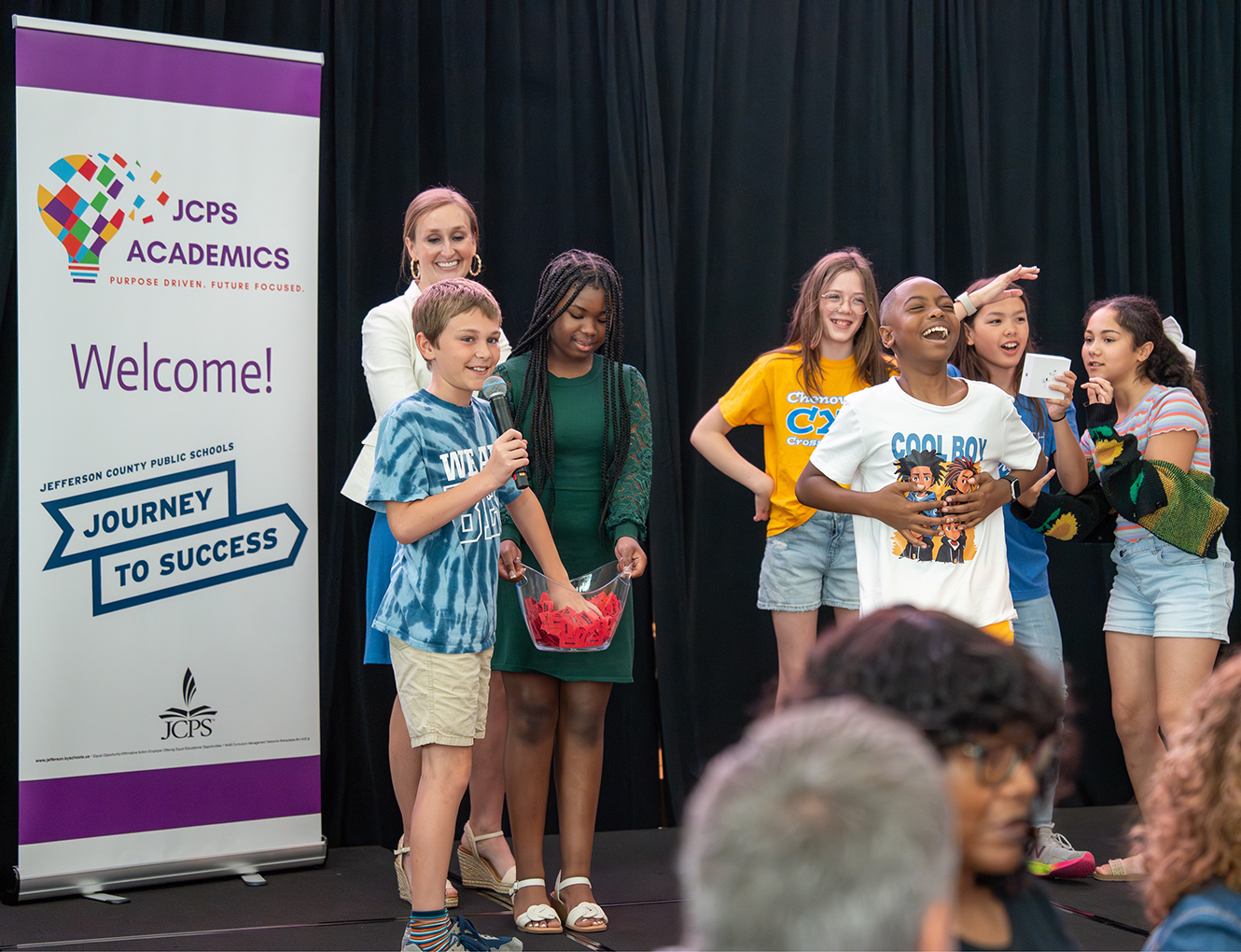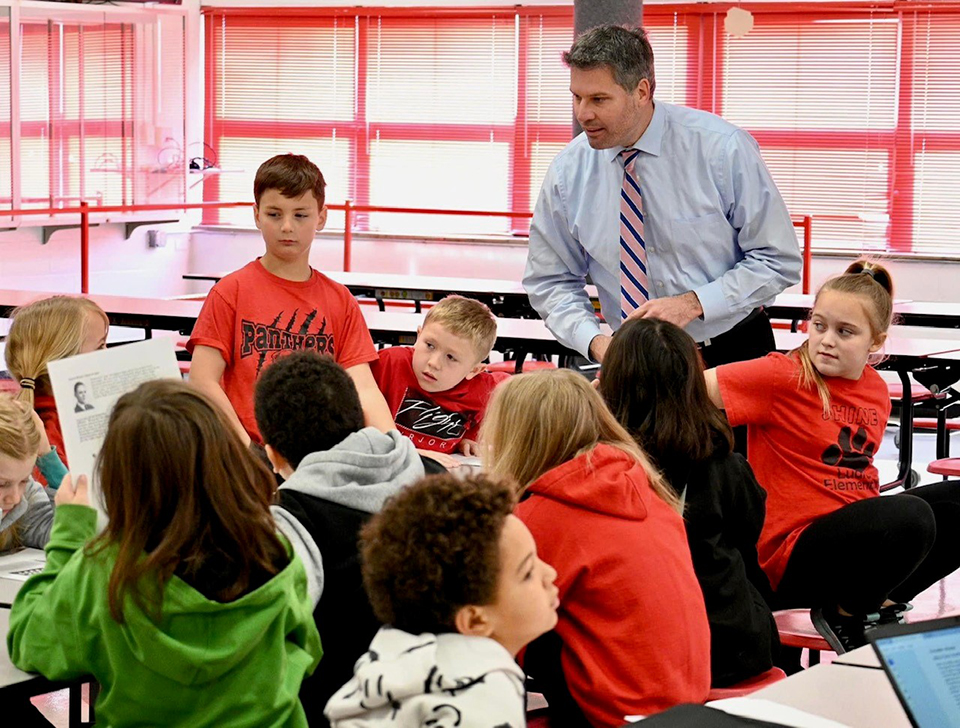
Library media specialist Heidi Neltner talks into a whisper phone while reading “Count The Monkeys” by Mac Barnett and Kevin Cornell with kindergarten students at Johnson Elementary School (Ft. Thomas Independent).
Photo by Amy Wallot, Sept. 17, 2014
By Brenna R. Kelly
Brenna.kelly@education.ky.gov
Heidi Neltner is one of The Others.
She’s not part of a mysterious tribe on the tropical island where survivors of a plane crash were stranded in the television show “Lost.” She’s a school librarian – one of five categories of “other” professionals who will begin using Kentucky’s new Professional Growth and Effectiveness System (PGES) this year.
More than 1,000 library media specialists, counselors, speech pathologists, psychologists and instructional coaches are piloting the system before it’s implemented for the 2015-16 school year.
For most, it will be the first time they will be measured using criteria specific to their field.
“They were always just lumped in as a teacher or a classified,” said Amy Jacobs, OPGES lead for the Kentucky Department of Education. Under OPGES, each of the five professions has its own framework that reflects what’s expected in each field.
“That’s the uniqueness of these frameworks, it doesn’t just look at them as sitting in a classroom with 20 kids delivering a lesson,” Jacobs said. “They may have a variety of services they provide, so the framework is based around what their job responsibilities are.”
For Neltner, who is starting her third year as librarian at Johnson Elementary School (Fort Thomas Independent), her evaluations up to this point haven’t been much different than the ones during her 10 years as a high school English teacher. While supervisors made sure she was meeting the district’s goals, they didn’t focus on what happens in the library, she said.
“They were kind of like, ‘Well, it looks like you’ve got it under control,’ ” Neltner said.
She believes OPGES will change that.
“I think it will be a little bit more eye-opening for our administrators to see all of the different things that we are responsible for,” she said. “We’re instructional leaders, we’re technology leaders and we are also essentially maintaining a store – there’s inventory and all kinds of stuff coming in and out all day.”
Most supervisors of these professionals do not have experience in their fields, Jacobs said.
“OPGES really puts the power in the professionals’ hands to say to their supervisor, ‘Here’s what I do in my field, here is what my field expects of me, what do you expect of me?’ ” she said.
Before OPGES, that lack of knowledge of other professions meant that many of these professionals had only informal reviews or sometimes no reviews at all, said Paul Baker, a school psychologist for the Martin County school district.
In many rural districts, the other professional may be the only person in the district in that field, he said. Some other professionals may even serve more than one district.
“Nobody in those districts really has that background, so they didn’t have a yardstick to measure them by,” said Baker, a member of KDE’s OPGES advisory committee and president of the Kentucky Association of Psychology in the Schools.
The OPGES system uses the same five measures of effectiveness – observation, self-reflection, professional growth, student voice and student growth – used in performance assessments of teachers.
The observation will be done by a peer and an evaluator. But in OPGES, the peer observer does not have to be someone in the same field; a guidance counselor could observe a speech therapist or a teacher could observe any of the categories, said Kathy Mansfield, KDE library media/textbooks consultant.
“It’s an opportunity for the person in the other professional role group to get feedback from someone outside their profession that could prove to be very valuable,” she said.
The way other professionals measure student growth will be different from how classroom teachers measure whether students are improving. Unlike classroom teachers, the other professionals will not have K-PREP or end-of-course test results.
“The point is if they are delivering some type of service to students, they need to measure what the point of their service is,” Jacobs said. “They measure what their service has provided to the students.”
For example, a guidance counselor could assess whether students have had fewer behavioral problems or whether attendance has increased.
Psychologists are still debating how to measure student growth, Baker said. Many psychologists’ main job is to assess students for special education eligibility.
“But that’s why you do the pilot, so you can work all the kinks out,” he said.
Other professionals must also write goals for themselves and reflect on their work. Many psychologists will welcome that opportunity for reflection, Baker said.
“I think it will be more work, but sometimes it’s good to reflect on what you’re doing,” he said. He hopes it will lead to conversations about school psychologists expanding their roles beyond assessing special education eligibility.
“We didn’t all get into this because we wanted to just give IQ tests,” he said. “This is an opportunity — take some time, even if it’s 5 percent of your time, and do some of these other things that we’ve been saying we want to do and just start doing them.”
Likewise, librarians hope that OPGES will help show the rest of the school staff that they are doing more than distributing books and providing planning time for classroom teachers.
“They are very hopeful about this tool that is specific to them,” Mansfield said. “Not only to help them reflect on their own practice and how to improve, but they’re hopeful for the chance for others to recognize the greater impact that they have on student achievement beyond face-to-face instruction.”
Mansfield and Jacobs have been crisscrossing the state for seven months, teaching other professionals about the system. They will continue to hold training sessions before the program is implemented statewide next school year.
Neltner also created a Google Hangout for librarians to discuss the system. More than 60 librarians quickly joined the hangout and other professionals were soon asking to join in the conversation. She also created a Google Community where librarians can post links and post resources.
Though she’s still exploring the system, Neltner likes what she has seen of OPGES. It will require a change in thinking, she said, because librarians aren’t used to analyzing their work and then telling other people about it.
“I think it’s going to bring to light the things that librarians are already doing,” she said. “It’s going to make it easier for us to publicize that and show how we are helping teachers and how we are helping students grow.”
FOR MORE INFO …
Amy Jacobs, Amy.Jacobs@education.ky.gov
Kathy Mansfield, Kathy.Mansfield@education.ky.gov
Heidi Neltner, Heidi.Neltner@forthomas.kyschools.us
Paul Baker, Paul.Baker@martin.kyschools.us



[…] Check out the archive here! Thanks to Heidi Neltner @heidinelt for moderating this lively discussion on communication, goals, advocacy, and more! Check out her article in Kentucky Teacher here too! […]